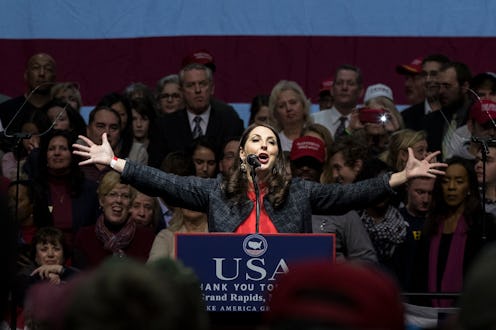News
Trump Didn't Denounce White Supremacists, So This Female Republican Stepped Up

On Wednesday, Republican National Committee Chairwoman Ronna Romney McDaniel appeared on ABC's Good Morning America to condemn right-wing extremists. The RNC leader said that neo-Nazis and white supremacists don't belong in the GOP, and had the following message for them: “We don’t want your vote, we don’t support you, we’ll speak out against you."
McDaniel's comments came on the heel of a gathering of white nationalists in Charlottesville, Virginia on Saturday — a gathering that McDaniel denounced as "un-American." Her remarks also directly contradicted those made by Donald Trump, who blamed the "alt-left" and "both sides" for the violence that took place in Charlottesville.
“The president was saying that people brought violence from both sides,” McDaniel told GMA host David Muir. “And violence isn’t OK, but the blame lays squarely at the KKK, the white supremacists, the neo-Nazis who organized this rally, caused violence and are pushing hate across this country.”
However, the RNC does not appear to be united in their disagreement with Trump. On Tuesday, RNC spokeswoman Kayleigh McEnany tweeted that Trump had "once again denounced hate," and that the Republican Party "stands behind his message of love and inclusiveness." It is unclear whether or not the RNC has shifted its position on the issue now that McDaniel has acknowledged the inadequate — and slow — nature of Trump's response.
In addition to condemning the white supremacists and neo-Nazis who organized the Charlottesville rally, McDaniel also called for increased bipartisanship in order to combat bigotry.
"This is not a Republican or Democrat issue," McDaniel told Muir. "It's going to take bipartisanship to bring people together around unifying this country and the president has called for that."
Despite McDaniel's unequivocal denunciation, it might be too late for the GOP to demonstrate that it does not pander to white supremacists. The Republican Party has for decades exploited white resentment of the apparent "other," and it is not enough for Republican leaders to denounce white supremacy. It is for this reason that "birther" conspiracies against Obama were able to flourish among GOP voters, and why many Republicans voted for Trump — their desire to remain loyal to their party was stronger than their desire to combat everything he stood for.
This is not to say that every member of the GOP is a white supremacist; white supremacy, however, is and has long been systemically upheld by the modern Republican Party and its leaders, and a verbal denunciation of a white supremacist rally is not enough to remedy decades of complicity.